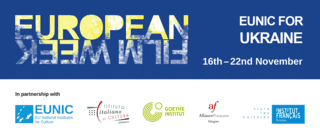|
2:00 PM, GMT
SHADOWS OF THE FORGOTTEN ANCESTORS
Film screening
-
Institut français d’Ecosse, Edinburgh
- Language English, Ukranian
- Price Free
- Part of series: EUNIC for Ukraine – European film week

The most prominent film in Ukrainian poetic cinema movement.
Synopsis
Based on a 1911 novel by Ukrainian writer Mykhailo Kotsiubynsky, Shadows of Forgotten Ancestors is a Romeo and Juliet story, in which the protagonists, two star-crossed lovers, hope to rebel against their warring families. Ivan (Ivan Mykolaichuk) is a young boy who falls in love with the Marichka (Larisa Kadochnikova). Marichka’s father, however, is responsible for the murder of Ivan’s father, so their relationship is fraught with tension. Ivan leaves the village to find work and make some money so that the two can be married. But in his absence, Marichka accidentally drowns, leaving Ivan bereft. He strikes up a new relationship with Palahna (Tatyana Bestayeva), and the two are married, but the match isn’t a success; Ivan still pines for Marichka. In response to Ivan’s neglect, Marichka turns to the affections of Yurko (Spartak Bagashvili), a local molfar, a person reputed to have magic powers. When Ivan learns of this, he tries to kill Yuko with an axe, but Yurko easily bests him. Fleeing to a nearby forest, Ivan thinks he sees Marichka, and pursues her spirit as it floats through the woods. But when Marichka’s spirit reaches out to touch Ivan’s hand, her caress is instantly fatal. With a cry, Ivan falls to the ground, dead.
Director: Serghiy Paradzhanov
Year: 1964
Length: 97 min
Subtitles: English
Source: Sense of Cinema
This project was made possible with the grant from the Culture of Solidarity-EUNIC Ukraine Fund, in partnership with the European Cultural Foundation and EUNIC with core financing led by the Goethe-Institut.
Synopsis
Based on a 1911 novel by Ukrainian writer Mykhailo Kotsiubynsky, Shadows of Forgotten Ancestors is a Romeo and Juliet story, in which the protagonists, two star-crossed lovers, hope to rebel against their warring families. Ivan (Ivan Mykolaichuk) is a young boy who falls in love with the Marichka (Larisa Kadochnikova). Marichka’s father, however, is responsible for the murder of Ivan’s father, so their relationship is fraught with tension. Ivan leaves the village to find work and make some money so that the two can be married. But in his absence, Marichka accidentally drowns, leaving Ivan bereft. He strikes up a new relationship with Palahna (Tatyana Bestayeva), and the two are married, but the match isn’t a success; Ivan still pines for Marichka. In response to Ivan’s neglect, Marichka turns to the affections of Yurko (Spartak Bagashvili), a local molfar, a person reputed to have magic powers. When Ivan learns of this, he tries to kill Yuko with an axe, but Yurko easily bests him. Fleeing to a nearby forest, Ivan thinks he sees Marichka, and pursues her spirit as it floats through the woods. But when Marichka’s spirit reaches out to touch Ivan’s hand, her caress is instantly fatal. With a cry, Ivan falls to the ground, dead.
Director: Serghiy Paradzhanov
Year: 1964
Length: 97 min
Subtitles: English
Source: Sense of Cinema
This project was made possible with the grant from the Culture of Solidarity-EUNIC Ukraine Fund, in partnership with the European Cultural Foundation and EUNIC with core financing led by the Goethe-Institut.
Location
Institut français d’Ecosse
West Parliament Square
Edinburgh EH1 1RF
United Kingdom
West Parliament Square
Edinburgh EH1 1RF
United Kingdom
Location
Institut français d’Ecosse
West Parliament Square
Edinburgh EH1 1RF
United Kingdom
West Parliament Square
Edinburgh EH1 1RF
United Kingdom